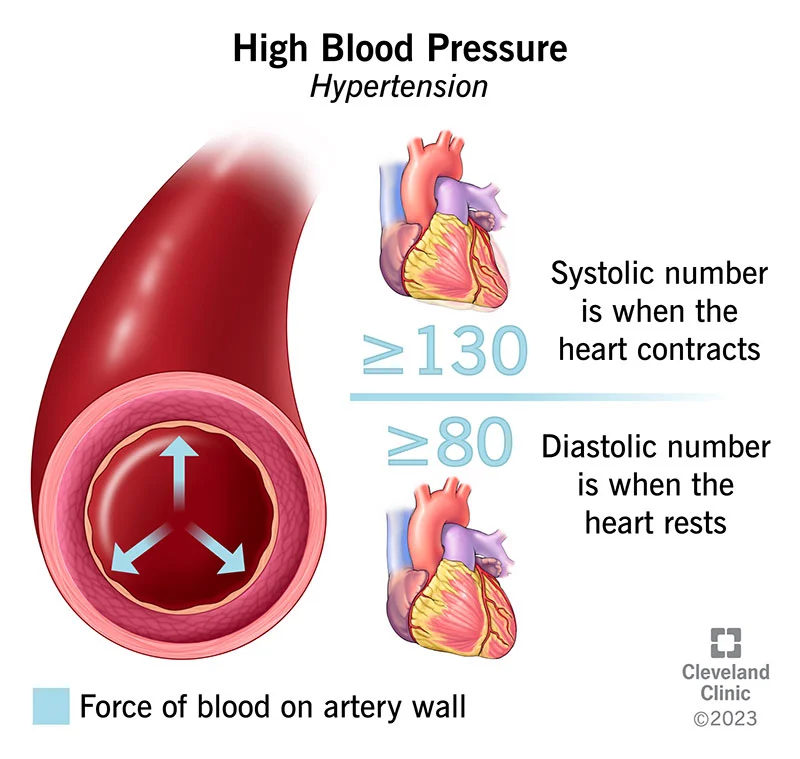Hypertension (high BP)

Introduction
Hypertension, commonly known as high blood pressure, is a widespread health issue that often remains unnoticed until it causes serious complications. Dubbed the “silent killer,” hypertension quietly damages your blood vessels, heart, and other vital organs. This article explores hypertension, its causes, risk factors, symptoms, diagnosis, treatment, and the importance of managing this condition.
Understanding Hypertension
Hypertension is a chronic medical condition characterized by consistently elevated blood pressure levels. Blood pressure is the force of blood against the walls of the arteries as the heart pumps it throughout the body. Two numbers represent blood pressure: systolic pressure (the top number) when the heart contracts, and diastolic pressure (the bottom number) when the heart relaxes. Normal blood pressure is typically around 120/80 mm Hg.
Causes and Risk Factors
The exact cause of hypertension is often unknown, but several factors contribute to its development. Common causes and risk factors include:
- Genetics: A family history of hypertension can increase your risk.
- Unhealthy Lifestyle: Poor diet, lack of physical activity, excessive alcohol consumption, and smoking.
- Age: Hypertension is more common in older adults.
- Obesity: Excess body weight places additional strain on the heart and blood vessels.
- Chronic Conditions: Diabetes, kidney disease, and sleep apnea are associated with high blood pressure.
- Stress: Chronic stress can contribute to elevated blood pressure levels.
Symptoms
Hypertension is often asymptomatic, which is why it’s called the silent killer. Most people with high blood pressure do not experience noticeable symptoms until it reaches a severe stage. In some cases, symptoms may include:
- Headaches: Particularly in the morning.
- Dizziness or Lightheadedness: Especially when standing up.
- Blurred Vision: Occasional vision problems may occur.
- Shortness of Breath: Especially during physical activity.
Diagnosis
Regular blood pressure checks are crucial for early detection. Hypertension is diagnosed based on multiple blood pressure readings taken over time. Diagnosis may involve:
- Blood Pressure Monitoring: Done at a healthcare provider’s office, at home with a blood pressure monitor, or through ambulatory monitoring.
- Physical Examination: To check for signs of target organ damage.
- Laboratory Tests: To identify underlying causes or risk factors.
Treatment Options
Managing hypertension is essential to prevent complications. Treatment approaches include:
- Lifestyle Modifications: Dietary changes (reducing sodium, increasing potassium), regular exercise, weight management, and stress reduction techniques.
- Medications: When lifestyle changes alone are insufficient, doctors may prescribe medications like diuretics, beta-blockers, ACE inhibitors, or calcium channel blockers.
- Regular Monitoring: Frequent check-ups to track blood pressure levels and adjust treatment as needed.
Importance of Management
Controlling hypertension is crucial because unmanaged high blood pressure can lead to serious complications, including heart disease, stroke, kidney problems, and vision impairment. Managing hypertension effectively can significantly reduce the risk of these health issues, improving overall quality of life.
Conclusion
Hypertension is a common and potentially dangerous condition that affects millions of people worldwide. Awareness, early detection, and appropriate management are crucial in preventing its adverse consequences. Making positive lifestyle changes, taking prescribed medications, and adhering to a regular monitoring schedule can help individuals with hypertension take control of their health and reduce the risks associated with high blood pressure. It’s important to note that modern medical science has not defined a cure for high blood pressure, but proactive health management can significantly improve outcomes.
What NNC says?
As above-described basic subject is to change life style to active.
2nd important is food management removed your acid food from menus.
3rd increase alkaline foods.
4th Set your platter at <25% carbs.
5th Increase hepatic and pancreatic enzyme production by changing foods.
6th Have our clinically proven herbal regime containing marjoram, wild Mint and fumaria +
Distilled herbal-waters and specific honey combination.
Stop some bad food permanently – Live without of drugs forever.
